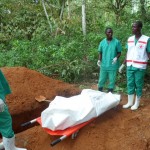Bawuya is a small, isolated Kpa-Mende farming village about 3 hours walking time from Taiama, headquarters of Kori chiefdom in Moyamba District, Southern Sierra Leone. Bawuya experienced an Ebola outbreak in September 2014, in which 9 people died and 3 infected persons survived, connected to a prior outbreak in a neighboring village, Fogbo. No further cases have since occurred. Bawuya serves as a representative example of how an isolated rural community becomes infected, and how such outbreaks end, where outside intervention or assistance is limited. The report analyzes randomly-sampled questionnaire data situating Ebola within the context of village social networking and patterns of health seeking behavior. Changes are documented in local understanding of Ebola, from earlier media-led conceptions of an epidemic driven by bush-meat consumption towards an experience-based understanding of the risks posed by body-to-body contact. The case makes clear that transmission of Ebola can be ended by local acceptance of a range of externally-determined and locally self-imposed restrictions on movement and contact with dead bodies. A brief discussion is included of questions raised by the community about how and when current restrictions on social interaction can be eased. Local views on these restrictions (including imposed modifications of funeral rituals and routines) are further elaborated in an appended transcript of three parallel village focus group sessions held with male elders, women and young people.
Paul Richards, Joseph Amara, Esther Mokuwa, Alfred Mokuwa, and Roland Suluku / 2015
